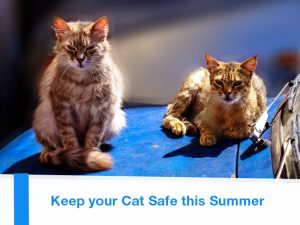
Keep your cat safe this summer

During the summer months, there are many hazards you should be aware of in order to keep your furry feline friend safe.
Just like dogs, cats can suffer heat stroke when exposed to hot temperatures, even if he or she lives indoors. Your cat should always have access to cool water, which should be available at different places throughout the house, particularly in the areas your cat spends more time at. If your cat has outdoors access place water bowls in shady areas to keep the water temperature more comfortable. Don't forget to frequently check the water level and wash the bowls daily. You can also use cat drinking fountains to induce your cat to drink more water or add ice cubs to the water bowls.
Your cat should have access to shaded areas to stay cool at all times. Make sure there is a cool place in your house your cat can go to.
Do not leave your cat locked in a parked car. Even a few minutes in a car, which can be located in a shaded area with the windows opened, can be deadly for your cat.
Young, older, obese and sick cats are more likely to suffer heat stroke. Signs of heat stroke in cats include restlessness, panting excessively and drooling.
It is also recommended to apply pet sunscreen to your cat's ears and nose, particularly if he or she is light coloured, as being so makes pets more susceptible to sunburns. Just like what happens with people, sunburns can lead to cancer.
Grass seeds can also be dangerous as they can get caught in your cat's paws, eyes or ears and need to be removed. Your pet may show signs of discomfort and shake his or her head.
In warmer months there are also more external parasites such as flea and ticks so make sure you use a safe and effective flea/tick control product on your cat. Please remember to never use a flea/tick dog treatment on your cat.
Bee stings are also more common during this time of the year and they can be really dangerous if the cat is allergic, if he or she is stung many times or if he or she is stung near the mouth or in the throat. This could lead to swelling of the airway and restrict breathing. If your cat has been stung by a bee take him or her to the vet!
Keep our tips in mind and enjoy a nice and safe summer with your cat!
Would you like to know more about cats? Check our Feline Courses:
Feline courses
Published: 07 Jul 2016
Read the previous article: Caring for your dog during the warm months

